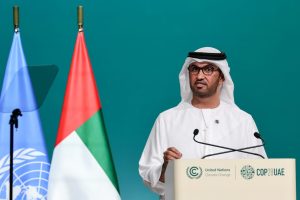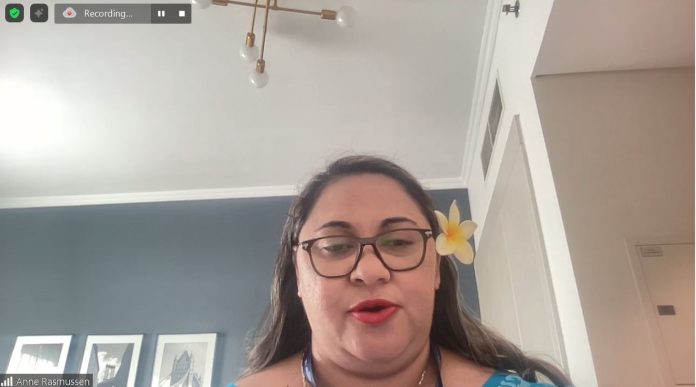By Pita Ligaiula at COP28 in Dubai, UAE
In a decisive moment at COP28, Small Island States clinched a historic win, but as the celebrations echoed, shadows of doubt lingered over the fund’s ability to truly deliver for the most vulnerable.
Anne Rasmussen, the Chair of Alliance of Small Island States (AOSIS), spoke exclusively to Pacific media, revealing the highs and hurdles following the historic decision at COP28.
“This decision marks a historical milestone for us, especially for Small Island States that we have been fighting for in the last 30 years,” Anne declared.
“It’s something we are very happy about. It’s only just the beginning. I think it is only just the capitalisation of the Fund.”
She detailed the progress made, acknowledging the swift pledges from countries like UAE, Germany, U.S and Japan.
The capitalisation process had commenced, offering a glimmer of hope. The TC five transitional committee, with its members from Small Island Developing States (SIDS), had toiled tirelessly, refining language on location sources and capitalisation of the fund.
“And AOSIS has always called for a stand-alone secretariat,” she emphasised. “At some point, we had to meet in the middle, making sure that while the World Bank is not the best host — and we’ve made that clear in our statement — the World Bank is stubborn, refusing to hear the calls of SIDS to reform.”
She spoke of safeguards and language, envisioning an interim host with a transition to a standalone secretariat. Yet, the reality struck as she acknowledged the need for at least US$100 billion per annum, echoing the words of experts for efficient direct access to finance.
Ian Fry, the UN Special Rapporteur on climate change and human rights carried a note of scepticism as he delved into the shortcomings of the decision.

“There’s no clear recognition of human rights as the underlying objective to the Fund,” Dr Fry said, his experience with the World Bank fuelling reservations about its role as the instrument administering the fund. He painted a stark picture of the costs faced by countries like Pakistan and the Pacific due to climate change impacts, raising concerns about the fund’s heavy reliance on pledges.
“I have to say, I was very surprised this was just graveled through,” Dr Fry admitted, voicing his hopes that leaders would engage in dialogue around loss and damage. “It’s good that we have something better than nothing. But I seriously think it’s not going to be adequate for the most vulnerable, and particularly the Pacific.”
The focus shifted to the next steps, particularly the composition of the board overseeing the Loss and Damage fund.
Dr Fry expressed concerns about replicating the model of the Green Climate Fund, urging for diversity in thought. His plea included a call for representation of indigenous peoples, poor communities, and a critical need for gender balance.
The Fund was first agreed upon during COP27, held in Sharm El Sheikh, Egypt, and becomes operational Thursday following the agreement reached by parties during 5 transitional committee meetings.
The 5th transitional meeting hosted earlier this month in Abu Dhabi was added by the COP28 Presidency following the impasse reached at the 4th meeting, where Parties reached a resolution.
The UAE Thursday announced it will commit US$100 million to the Fund, paving the way for other nations to make pledges to the critically important Fund, following calls by Dr Sultan in the lead up to COP28.
COP 28 President Dr Al Jaber called on nations to follow the UAE’s example to immediately commit resources to the Fund in an ambitious multilateral act.

“What was promised in Sharm El Sheikh, has already be delivered in Dubai.” Dr Al Jaber said today, “the speed at which the world came together, to get this Fund operationalised within one year since Parties agreed to it in Sharm El Sheikh is unprecedented”.
This decisive action on Loss and Damage will enable the Parties to focus on the strongest possible response to the Global Stocktake, the world’s report card on progress toward Paris Agreement goals.
“This Fund will support billions of people, lives and livelihoods that are particularly vulnerable to the effects of climate change,” said Dr Sultan.
“I want to thank my team for all their hard work to make this possible on day one of COP28. It proves, the world can unite, can act, and can deliver. Over the next two weeks this Presidency will work with Parties to now deliver the highest-ambition response to the GST.”
Other countries making notable commitments included Germany, which committed US$100million, the UK, which committed £40million (US$50 million) for the Fund and £20million (US$25 million) for other arrangements, Japan, which contributed $10million and the U.S, which committed US$17.5million.
SOURCE: PACNEWS














